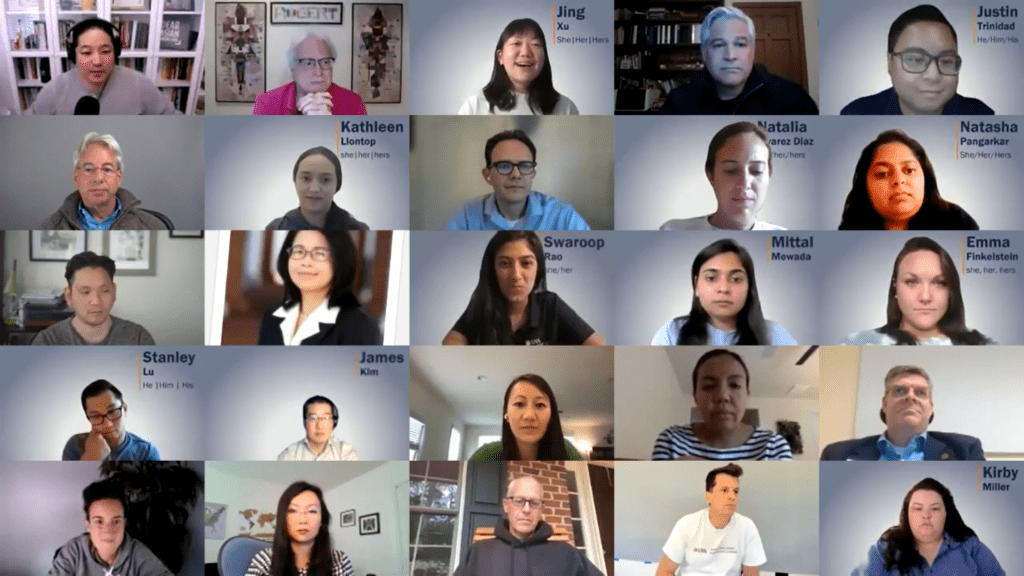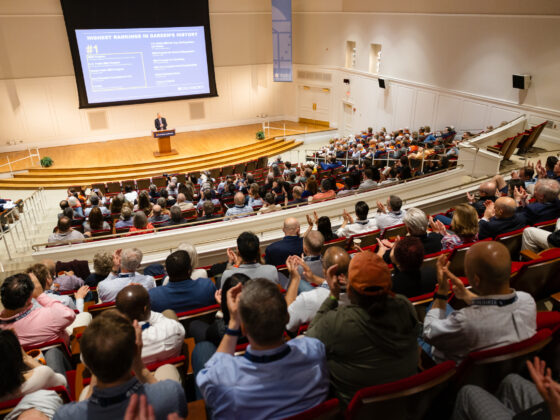In May, Class of 2022 students Jing Xu, Swaroop Rao, and Justin Trinidad hosted an event to discuss the experience of the Asian, Native Hawaiian, and Pacific Islander (ANHPI) community at Darden and in the broader world. The event, which included a discussion led by recent Michigan-Ross graduate and Just Like Media Founder Jerry Won, came in the wake of a significant increase in reports of anti-Asian hate crimes across the United States. Xu, Rao and Trinidad contributed this report on the event, which attracted more than 100 participants across the community.
Pictured above L-R: Swaroop Rao, Justin Trinidad, Jing Xu
On 16 March, six Asian women were tragically murdered in Atlanta in a racially motivated incident that occurred in the wake of drastic increase of hate crimes against Asian Americans. According to Stop AAPI Hate, more than 6,600 anti-Asian racist incidents were reported for the 12 months ending 31 March, a significant increase over the prior year. The Stop AAPI Hate website noted that women reported 2.3 times more than men, youth reported 12.6 percent of incidents, and seniors reported 6.2 percent of the total incidents. Incident reports have come from all 50 states and the District of Columbia.
The Asian, Native Hawaiian, and Pacific Islander identity (ANHPI) in America is complicated and nuanced. “There is a large misconception when it comes to ANHPI members being perceived as a monolith, and greater awareness is needed on the disparate outcomes for different minority groups within the ANHPI umbrella,” said Trinidad. Frequently, people assume that Asian Americans have high rates of educational attainment and higher incomes than other racial groups. In reality, however, the ANHPI community is made up of over 48 ethnic groups, all of whom have unique immigration histories to the U.S., and as a result, dramatically different life and education outcomes. For example, in a study conducted in 2018, 18.2 percent of Cambodians lived in poverty, compared to the national average of 11.2 percent individuals. The Asian model minority myth is typically used as a racial wedge to pit marginalized communities against each other. Disaggregating the data of the ANHPI community is crucial to understanding differences in life outcomes between ethnic groups and is vital to truly understanding the needs of the community.
During May’s Asian Pacific American Heritage Month, Darden First Year students Jing Xu, Swaroop Rao, and Justin Trinidad brought together the Darden community in a conversation facilitated by ANHPI storyteller, Jerry Won. Attended by over 100 faculty, staff, students, and administration, Won discussed the importance of dismantling the model minority myth, the origins of the term “Asian American” — which dates back to coalition building with Black students at Berkeley in the 60s — and the necessity of working in coalition with other marginalized communities to dismantle systems of oppression.
Won challenged the audience to reflect and unpack their own experiences as ANHPIs or allies, to call out microaggressions, and to demand concrete actions from companies — beyond a Tweet or a statement.
“After speaking to our ANHPI classmates regarding the rise of anti-Asian violence, some have expressed concerns about their safety and lack of belonging within the community,” said Xu. “We organized this event in order to make sure that students, faculty, and staff know about the unique barriers that the ANHPI community faces in the hopes that they will join us in advocating on behalf of our ANHPI students and staff.”
While Darden has progressed significantly in its efforts to make the overall community more inclusive, like many institutions, there is still a long journey ahead. “We aim to work with administration, faculty, alumni, and student leadership to continue progressing towards a truly equitable and inclusive community for everyone at Darden and bring an ANHPI perspective into meaningful dialogues,” commented Rao on the long-term vision. For instance, the ANHPI community often lacks explicit representation in conversations about diversity, equity, and inclusion due to the falsehoods of the model minority myth. With both national recognition and internal efforts to address the inequities faced by the ANHPI community, we must ensure there is true representation of the diverse community under the “Asian” umbrella, meaningful inclusion when discussing race-related issues, and greater representation and elimination of biases in case discussions.






